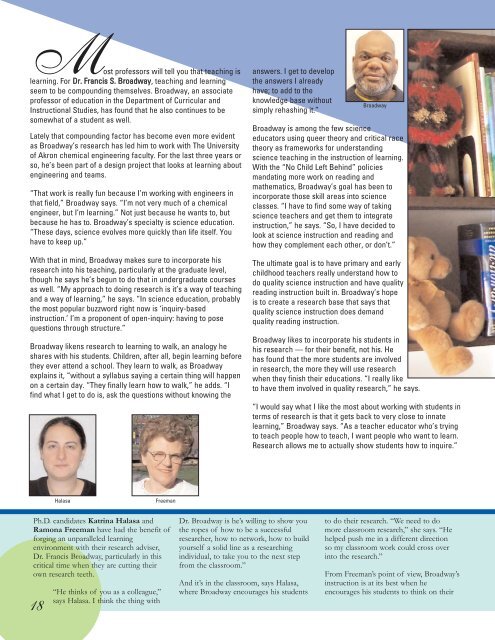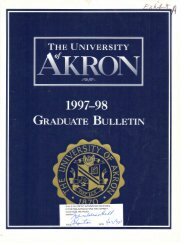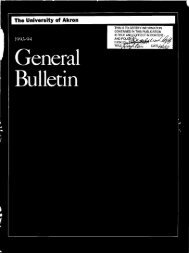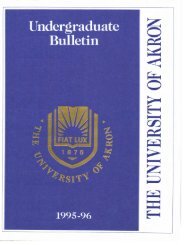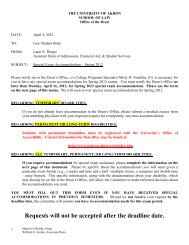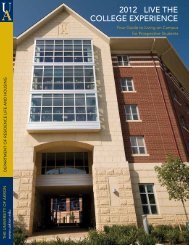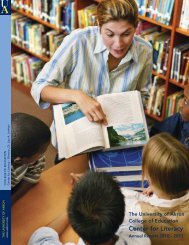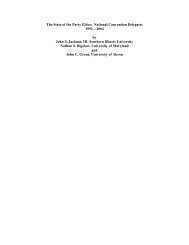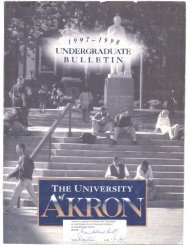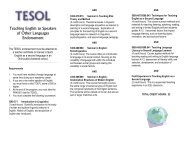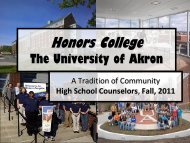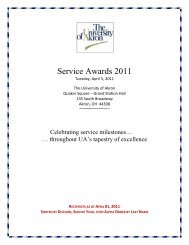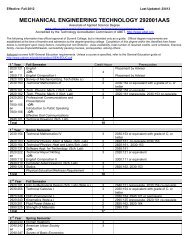2005_vprdoc PSpreads2.qxp - University of Akron
2005_vprdoc PSpreads2.qxp - University of Akron
2005_vprdoc PSpreads2.qxp - University of Akron
Create successful ePaper yourself
Turn your PDF publications into a flip-book with our unique Google optimized e-Paper software.
Most pr<strong>of</strong>essors will tell you that teaching is<br />
learning. For Dr. Francis S. Broadway, teaching and learning<br />
seem to be compounding themselves. Broadway, an associate<br />
pr<strong>of</strong>essor <strong>of</strong> education in the Department <strong>of</strong> Curricular and<br />
Instructional Studies, has found that he also continues to be<br />
somewhat <strong>of</strong> a student as well.<br />
Lately that compounding factor has become even more evident<br />
as Broadway’s research has led him to work with The <strong>University</strong><br />
<strong>of</strong> <strong>Akron</strong> chemical engineering faculty. For the last three years or<br />
so, he’s been part <strong>of</strong> a design project that looks at learning about<br />
engineering and teams.<br />
“That work is really fun because I’m working with engineers in<br />
that field,” Broadway says. “I’m not very much <strong>of</strong> a chemical<br />
engineer, but I’m learning.” Not just because he wants to, but<br />
because he has to. Broadway’s specialty is science education.<br />
“These days, science evolves more quickly than life itself. You<br />
have to keep up.”<br />
With that in mind, Broadway makes sure to incorporate his<br />
research into his teaching, particularly at the graduate level,<br />
though he says he’s begun to do that in undergraduate courses<br />
as well. “My approach to doing research is it’s a way <strong>of</strong> teaching<br />
and a way <strong>of</strong> learning,” he says. “In science education, probably<br />
the most popular buzzword right now is ‘inquiry-based<br />
instruction.’ I’m a proponent <strong>of</strong> open-inquiry: having to pose<br />
questions through structure.”<br />
Broadway likens research to learning to walk, an analogy he<br />
shares with his students. Children, after all, begin learning before<br />
they ever attend a school. They learn to walk, as Broadway<br />
explains it, “without a syllabus saying a certain thing will happen<br />
on a certain day. “They finally learn how to walk,” he adds. “I<br />
find what I get to do is, ask the questions without knowing the<br />
answers. I get to develop<br />
the answers I already<br />
have; to add to the<br />
knowledge base without<br />
simply rehashing it.”<br />
Broadway<br />
Broadway is among the few science<br />
educators using queer theory and critical race<br />
theory as frameworks for understanding<br />
science teaching in the instruction <strong>of</strong> learning.<br />
With the “No Child Left Behind” policies<br />
mandating more work on reading and<br />
mathematics, Broadway’s goal has been to<br />
incorporate those skill areas into science<br />
classes. “I have to find some way <strong>of</strong> taking<br />
science teachers and get them to integrate<br />
instruction,” he says. “So, I have decided to<br />
look at science instruction and reading and<br />
how they complement each other, or don’t.”<br />
The ultimate goal is to have primary and early<br />
childhood teachers really understand how to<br />
do quality science instruction and have quality<br />
reading instruction built in. Broadway’s hope<br />
is to create a research base that says that<br />
quality science instruction does demand<br />
quality reading instruction.<br />
Broadway likes to incorporate his students in<br />
his research — for their benefit, not his. He<br />
has found that the more students are involved<br />
in research, the more they will use research<br />
when they finish their educations. “I really like<br />
to have them involved in quality research,” he says.<br />
“I would say what I like the most about working with students in<br />
terms <strong>of</strong> research is that it gets back to very close to innate<br />
learning,” Broadway says. “As a teacher educator who’s trying<br />
to teach people how to teach, I want people who want to learn.<br />
Research allows me to actually show students how to inquire.”<br />
Halasa<br />
Freeman<br />
Ph.D. candidates Katrina Halasa and<br />
Ramona Freeman have had the benefit <strong>of</strong><br />
forging an unparalleled learning<br />
environment with their research adviser,<br />
Dr. Francis Broadway, particularly in this<br />
critical time when they are cutting their<br />
own research teeth.<br />
18<br />
“He thinks <strong>of</strong> you as a colleague,”<br />
says Halasa. I think the thing with<br />
Dr. Broadway is he’s willing to show you<br />
the ropes <strong>of</strong> how to be a successful<br />
researcher, how to network, how to build<br />
yourself a solid line as a researching<br />
individual, to take you to the next step<br />
from the classroom.”<br />
And it’s in the classroom, says Halasa,<br />
where Broadway encourages his students<br />
to do their research. “We need to do<br />
more classroom research,” she says. “He<br />
helped push me in a different direction<br />
so my classroom work could cross over<br />
into the research.”<br />
From Freeman’s point <strong>of</strong> view, Broadway’s<br />
instruction is at its best when he<br />
encourages his students to think on their


